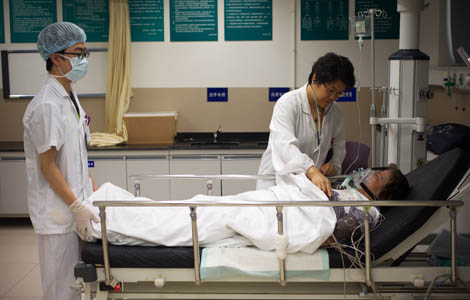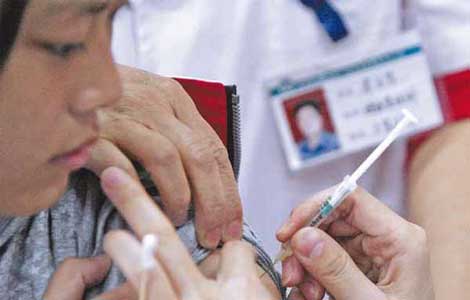DuPont serves up new Beijing probiotic facility
Updated: 2013-07-12 17:22
By ZHONG NAN (chinadaily.com.cn)
|
||||||||
With more food buying and selling going on in the world's most populous market, the US company DuPont has launched a probiotic blending and packaging facility in Beijing to cater the nation's surging demand for probiotics and cultures products.
DuPont purchased a food processing plant in the Chinese capital in 2011, and converted it into a probiotic blending and packaging plant to serve dietary supplement, food and beverage consumers in both China and Asia Pacific region. The investment is part of a global multi-year capacity expansion programs for cultures and probiotics in the US, Europe and now in China.
"Probiotics is the fast growing part of our business, experiencing double digit growth rates annually around the world and in China," said Fabienne Saadane-Oaks, vice-president of health and protection, DuPont Nutrition and Health.
"As we continue to support the world's growing population, this expansion allows us to custom blend and package probiotic products in China's fast-growing dietary supplement, food and beverage industries."
Rising incomes, fast urbanization pace and the new round of population movement in China are driving demand for more diversified and convenient diets. Higher income has also increased the consumption of various ingredients diary products and meat proteins. Urban residents normally prefer faster cooked food therefore they can have more time to carry out other works.
"DuPont still sees the upside on the daily caloric intake of consumers in China, especially on nutrition and health products," said Li Yongjing, president of DuPont Nutrition and Health, China. "Beverage, packaged and canned food companies are also expected to reap robust returns from China."
To feed a population of more than 1.3 billion, more food and beverage products are now produced and sold in China than anywhere else, and this has boosted the overall food consumption in China during the past decades. China has become a fast growing market for international agricultural and food producers from the US and Europe.
"Food consumption is a reflection of economic environment. Food consumption is rising. The types of foods people eat are diversifying. Foods are becoming more sophisticated and they need to be more convenient, so the eating habit and whole food industry have dramatically transformed in China," said Stephane Constant, executive vice-president of active nutrition, DuPont Nutrition and Health.
Constant said the most distinct is the modernization of livestock and the food supply chain, where is a big area and there are lots of investments going on there. Some Chinese companies are rising to become the top in the world. Processed food such as canned food, related with cooking and restaurants, has grown fast.
"The demand for fast food, yogurt, milk, juice and soft drinks will provide a number of opportunities for food and ingredient businesses. We have seen lots of potential in this sector."
The probiotics formulations offer unique improvement for digestive, immune health and other well-being benefits for the dietary supplement, diary and beverage markets. Probiotics cultures will be sourced from the company's US and European production facility. The new plant in China will be able to custom blend the ingredients to meet the requirements of local consumers.
According to the industry estimates by Dairy Association of China, China consumed 30 billion yuan probiotic products. The total consumption amount would reach 42 billion yuan by 2015. More than 85 percent of the total is attributed to food, beverage and dietary supplements.
This plant is the eighth site of DuPont's Nutrition and Health business in China, which provide a range of food ingredients, from emulsifiers, hydrocolloids, enzymes and sweetener ingredients to food protection ingredients, soy protein, lecithin, fiber and molecular diagnostic solutions.
According to the company, there are 53 employees operating the plant in Beijing’s Huairou district, investment and capacity weren't disclosed.
Most Viewed
Editor's Picks

|

|

|

|

|

|
Today's Top News
US diplomat says China ties a priority
Nation falling short on IT security
Weiner not dropping out of NYC mayoral race
Death toll from H1N1 in Argentina reaches 38
DPRK halt on rocket facility confirmed
Celebrations erupt after word of regal delivery
Office to close due to protest in Manila
Multinationals' dependence on China grows
US Weekly

|

|















